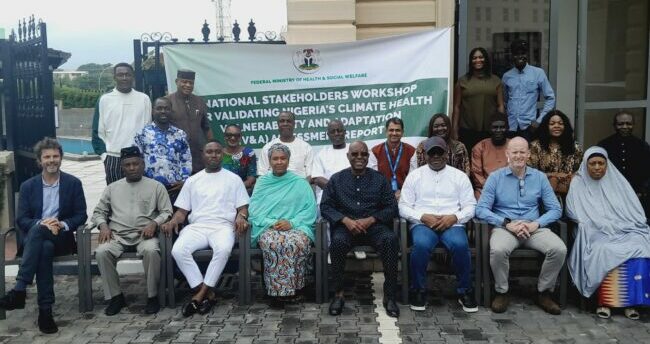The Federal Government in collaboration with international organizations, stakeholders, and climate change experts have validated climate change health adaptation policy in a deliberate effort to prevent the emergence of diseases resulting from climate change-induced factors.
The two-day National Stakeholders Validation Workshop on Nigeria’s Climate Health Vulnerability and Adaptation (V&A) Assessment Report, aimed to provide recommendations, mitigation strategies, and enhance resilience to cushion the incidence of diseases stemming from the climate crisis.
The assessment workshop which was organised by the Federal Ministry of Health and Social Welfare, was supported by the World Health Organization and the Foreign and Commonwealth Office(FCDO)

The Director of Public Health, Federal Ministry of Health and Social Welfare, Dr. Chukwuma Anyaike, in an interview with the media, explained that Nigeria’s healthcare system is based on the principle of primary health care.
Anyaike also highlighted the profound impact of climate change, particularly on infectious organisms, stressing the need to develop a document that aligns with the Ministry’s objectives and involves industrial engineers in addressing health challenges.
Anyaike also explained that there had been an upsurge of flooding with the attendant health complications in the country.

“For instance, the country has witnessed cases of cholera, some places where mosquitos do not breed, the effect of climate has made it warmer for the vectors to breed in such places, which increases the burden of malaria.

“There is also the case of flooding with the attendance of increasing the breeding sites of lymphatic filariasis,” he said.
According to him, of the 774 local government areas visited, 583 of them have a high burden of lymphatic filariasis, commonly known as elephantiasis.
The director said that the flooding had washed the farms and destroyed property in many places.
He disclosed that 40 per cent of complications of flooding come from drowning adding that there are lots of issues that have to do with climate change and its impact on health, so we are here to come up with the development of a document to address the health issues caused by it.
“First we need to find out the vulnerability and the impact on health, we have all the relevant stakeholders, and we are there to come out with a document that is implementable.”
Similarly, the Country Representative of WHO in Nigeria, Dr Walter Kazadi Mulombo represented by Dr Edwin Isotu Edeb, National Technical Officer for Public Health and Environment, expressed WHO’s support for the Federal Ministry of Health in validating reports on climate health, adaptation, vulnerability, and resilience.
He pointed out the increasing vulnerability of health to climate change, exacerbated by the escalating instances of flooding in the country leading to disease outbreaks.
He reiterated the surge in cholera cases in Lagos and Bayelsa, coupled with the impact of floods on health facilities, underscores the urgent need to address climatic challenges affecting healthcare delivery.
The evolving climate patterns have not only affected human life and productivity but have also posed significant health risks. The stakeholders gathered to formulate a policy document aimed at mitigating the impact of climate change on healthcare in Nigeria.
He stressed that the escalating flooding, which serves as breeding grounds for disease vectors, has led to a rise in malaria cases and other waterborne diseases.
The WHO representative stressed the importance of proactive measures within the health sector to combat climate-induced challenges and bridge existing gaps.
“The validation of the report by stakeholders signifies a crucial step towards identifying priority interventions for implementation in Nigeria. These interventions align with the national health security agenda and the Health Minister’s goal of safeguarding the Nigerian population from health emergencies.”
The Senior Health Adviser at the Foreign Commonwealth and Development Office (FCDO), Dave McConalogue, while addressing the financial aspects and adaptation strategies outlined in the assessment, disclosed the UK’s support for the process over the past year.
He stressed the significance of financing economic mobility and adaptation assessments which helps Nigeria fulfill its commitments made at COP 26 in building a climate-resilient, low-carbon healthcare system.
“Apart from the FCDO, various health partners are collaborating closely with the Federal Ministry of Health and other sectors to advance this critical agenda.
“The assessment’s outcomes will provide valuable insights at the national, state, and local government levels, guiding effective responses to climate challenges within the healthcare sector.”
Speaking on gender vulnerability, Mrs. Rukayya Mohammad, Director of the Help Desk at the National Climate Council in Nigeria, highlighted the gender policies addressing gender-based violence and the inclusion of gender-related recommendations in the assessment.
She further assured Nigerians of forthcoming gender-related initiatives.
“The assessment represents a positive development in line with the National Council on Climate Change’s mandate to integrate climate change activities across all sectors, including healthcare.
“Climate change serves as a catalyst for disease multiplication, especially with the increase in flooding, drought, and desertification leading to disease outbreaks such as the recent cholera incidents in Lagos and Bayelsa state.
”The National Council on Climate Change aims to embed climate change programs and initiatives in the healthcare sector, promoting environmentally-friendly practices such as green procurement processes, renewable energy utilization, and reducing the sector’s carbon footprint,” she added.
ALSO READ THESE TOP STORIES FROM NIGERIAN TRIBUNE
Minimum wage: Joint unions to shut down states that fail to pay —Arapasopo








